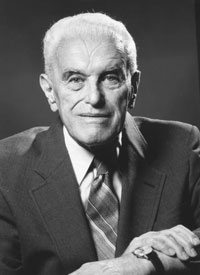John C. Harsanyi
| John Harsanyi | |
|---|---|
 |
|
| Born | Harsányi János Károly May 29, 1920 Budapest, Hungary |
| Died | August 9, 2000 (aged 80) Berkeley, California, USA |
| Nationality | United States |
| Fields | Economics |
| Institutions |
University of California, Berkeley Wayne State University Australian National University University of Queensland |
| Alma mater |
University of Lyon University of Budapest University of Sydney Stanford University |
| Doctoral advisor | Kenneth Arrow |
| Known for |
Bayesian games Utilitarian ethics Equilibrium selection |
| Influenced | Kenneth Binmore |
| Notable awards |
Nobel Memorial Prize in Economic Sciences (1994) |
| Spouse | Anne Klauber |
Nobel Memorial Prize in Economic Sciences (1994)
First prize in Eötvös mathematics competition
John Charles Harsanyi (Hungarian: Harsányi János Károly; May 29, 1920 – August 9, 2000) was a Hungarian-American economist and Nobel Memorial Prize in Economic Sciences winner.
He is best known for his contributions to the study of game theory and its application to economics, specifically for his developing the highly innovative analysis of games of incomplete information, so-called Bayesian games. He also made important contributions to the use of game theory and economic reasoning in political and moral philosophy (specifically utilitarian ethics) as well as contributing to the study of equilibrium selection. For his work, he was a co-recipient along with John Nash and Reinhard Selten of the 1994 Nobel Memorial Prize in Economics.
Harsanyi was born on May 29, 1920 in Budapest, Hungary, the son of Alice (Gombos) and Charles Harsanyi, a pharmacy owner. His parents converted from Judaism to Catholicism a year before he was born. He attended high school at the Lutheran Gymnasium in Budapest. In high school, he became one of the best problem solvers of the KöMaL, the Mathematical and Physical Monthly for Secondary Schools. Founded in 1893, this periodical is generally credited with a large share of Hungarian students' success in mathematics. He also won the first prize in the Eötvös mathematics competition for high school students.
Although he wanted to study mathematics and philosophy, his father sent him to France in 1939 to enroll in chemical engineering at the University of Lyon. However, because of the start of World War II, Harsanyi returned to Hungary to study pharmacology at the University of Budapest (today: Eötvös Loránd University), earning a diploma in 1944. As a pharmacology student, Harsanyi escaped conscription into the Hungarian Army which, as a person of Jewish descent, would have meant forced labor.
...
Wikipedia
